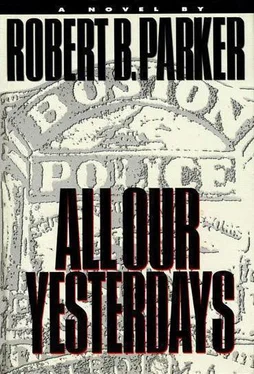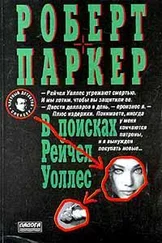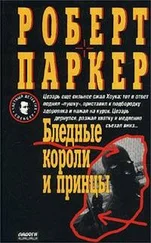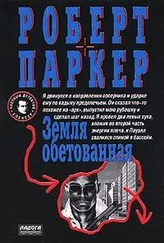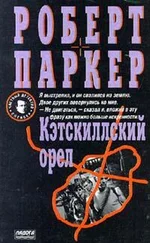Beside Conn was a tall, narrow, high-shouldered Australian Irishman named Seamus O’Gorman. He’d been a sharpshooter in the World War and was the commander of the Hollyford battalion.
“There’s a stone wall across the road,” Conn said.
“May give you cover, won’t help you much getting in there.”
“We could fire from behind it, to keep their heads down,” Conn said.
“And what?”
“And blow in the gable end.”
“The floor of them barracks is six feet higher than the outside ground, bucko. You might as well try to shift the fucking Rock of Cashel.”
“You never know,” Conn said. “How many rifles in the battalion?”
“Six, plus yours if you’ll be using it.”
“That’s what I brought it for,” Conn said.
“Fine.”
“Another thing,” Conn said. “I am, at least for this operation, your battalion commander. There’ll be no need for being too formal, but it’ll go better if you don’t call me bucko!”
O’Gorman met Conn’s eyes. He was a leathery man, nearly Conn’s height, older than Conn, and full of a veteran’s arrogance for new officers. He held Conn’s eyes for a moment. And felt the near physical force of them, and looked away.
“That’ll be fine with me, Conn.”
Conn smiled. He was wind reddened and sun darkened and his smile was a bright contrast.
“Good,” he said.
They walked back down the hill toward the village, rifles slung over their shoulders, khaki ammunition slings slanting across their chests. In the countryside the rebellion was no longer covert. Beyond the village the hills were bright green, rolling toward Glenough under a high, hard sky where white clouds ran raggedly before strong winds.
That night Conn sat with O’Gorman, and the battalion lieutenant, in a slate-roofed little house about a mile from the village. In a kitchen dense with the peat fire, under fat bacon hanging from the smoke-blackened rafters, they studied a map, and ate potato cakes and drank strong tea. The police and military barracks Shevry, Kilcommon, Annacarty, Cappagh White, Doon, Dundrum, and Rearcross.”
“There’s a big one at Pallas,” the lieutenant said. “Twenty miles. And Goolds Cross, and Tipperary, twenty, and Newport twenty-seven. Soldiers as well as peelers in Tipperary and Newport.”
“We’ll block the soldiers,” Conn said. “Here, at the crossroads,” he marked on the map. “And here. How much gelignite is there?”
“Close to half a hundred,” O’Gorman said. “A little blasting powder, three pounds and a little of gunpowder, plenty of fuse, and two boxes of detonators.”
Conn went to the shed with him to examine the gelignite. It was frozen. They put pots of water on to thaw it. The steam from the bubbling water added to the atmosphere as the three men huddled over the map. O’Gorman’s gray wife moved silently about the kitchen, stoking the fire, pouring more tea. No one paid her heed. The tea had been taking heat from the fire all day. It had long since ceased to draw, and begun to stew. Conn swallowed some and shook his head.
“A bleeding mouse could trot across that tea,” he said. The other men laughed. They were much older than Conn, especially the lieutenant, a short, plump man who’d been a cook with the British army in India.
“’Tis a darling thing, Cap’n, sir,” he said, “to see a fancy fucking Dublin boy drink proper country tea.”
Outside it had begun to rain. A cold rain, barely above freezing’.
“How much ammunition?” Conn said.
“Twenty rounds a rifle,” O’Gorman said. “Some shotguns, and four hand grenades. There are ten or twelve policemen in the Hollyford Barracks.”
“With all the ammunition they’ll ever need,” Conn said.
They were silent. The rain sounded on the roof, the squares of slate, carefully lapped from peak to eaves, resting on close-spaced rafter poles.
“It makes no sense to rush it.”
“None at all, at all.”
“We’ll burn them out,” Conn said.
“How?”
“From the roof,” Conn said. “The gable end has only one window. We can keep people away from it by rifle fire, and go up to the roof there.”
“Man, dear, it’s forty feet. We don’t have a forty-foot ladder in the county.”
“We’ll splice two twenty-footers,” Conn said. “We’ll make some bursting charges to blow off the slate, and we’ll burn them out from above.”
“Might work,” O’Gorman said. “Who goes to the roof?”
“I will,” Conn said. “If I can swallow this tea, I can climb that roof.” He smiled his brilliant smile in the smoky room. “With one heroic volunteer.”
“I’ll go with you, I guess,” O’Gorman said.
They spent the rest of the evening waiting and getting ready. Conn disassembled and oiled the big Webley .45 he carried under his coat. He cleaned and oiled it nearly every day. But he had nothing else to do while he waited. He took the German automatic, 9-mm parabellum, from its holster under his other arm. He oiled the pistol and the magazine spring, tucked bullets into the magazine, put a round in the chamber, and put it back with the hammer cocked and the safety set. The men in the kitchen improvised hand grenades by packing scrap iron in tin cans around a stick of gelignite. Other men arrived, gathering quietly, in the front room, some in the shed; cleaning and oiling rifles, and shotguns, practicing with the spliced ladder against the side of the barn. They didn’t talk very much. The rain pattered on the roof. Mrs. O’Gorman and her daughters stayed quiet in the corner of the kitchen, murmuring the rosary.
It was an hour till midnight when a thin little man in a tweed cap and a black raincoat arrived on his bicycle to say that the Volunteers had begun to fell trees and pile stone barricades across the roads. His name was Feeney.
“In the pass,” he said, “there are no trees handy, and not enough rocks.”
“Can you find a way to block it?” Conn asked.
Feeney grinned.
“I’ll have them throw the road over the ditch, Cap’n.”
Conn nodded. The fire made a dim reflection on Feeney’s wet rubberized coat. Feeney’s cap was sodden and shapeless.
“And the wires?” Conn said.
“We’ll cut them at midnight, telephone and telegraph both, sir.”
At five after midnight they set out. Conn, O’Gorman, five shotguns, and seven rifles. Because he would be climbing the roof, Conn donated his rifle to Dennis Tracy, who would be in charge of the ground party.
“Musha,” Conn said with a wide smile, as they moved out. “I feel like a tinker.”
He and O’Gorman each carried two handguns, grenades, hammers and bursting charges, and on their backs each a tin of petrol. Oil soaked squares of sod hung from ropes around their necks. Oil soaked into their clothes. Four men carried the ladder. Others carried paraffin oil in zinc buckets.
The rain wasn’t heavy but it came without surcease as they walked silently toward the police barracks. In the slippery darkness one of the men carrying the ladder stumbled.
Someone said, “Jesus Christ, man.”
Conn’s voice was soft and sharp as he spoke to them.
“Quiet now, lads. The less the peelers hear us, the less they’ll know what’s happening. A silent assault is a frightening thing.”
In the back one of the men murmured, “Cap’n’s a stone killer, where’d he come from?”
“They sent him down from Dublin.”
Again Conn’s voice cut the darkness.
“Quiet.”
They went forward in silence. Close to the barracks the laddermen took off their boots. The rifles and shotguns took the places they’d been assigned, three to lay down fire on the gable-end window, the rest to cover doors and windows. The men with the paraffin oil put the buckets down at the base of the gable end and retreated to cover. The laddermen raised the ladder.
Читать дальше
